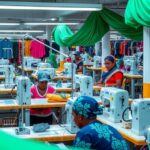Bangladesh’s Yunus Appeals to Trump for Tariff Suspension Amid Economic Struggles
Muhammad Yunus, Chief Advisor of Bangladesh, has urged President Trump to delay new tariffs on Bangladeshi exports for three months. The tariffs, which increased to 37%, heavily impact the Ready-Made Garments sector, worth $8.4 billion annually. The Bangladeshi economy has weakened since the interim government took charge, facing liquidity crises and labor unrest. Political stability is essential for attracting investments.
Muhammad Yunus, the Chief Advisor of Bangladesh’s interim government, has formally requested a three-month suspension of reciprocal tariffs on Bangladeshi exports to the United States in a letter addressed to President Donald Trump. The tariffs, which recently increased from an average of 15% to 37%, significantly affect Bangladesh’s primary export sector, especially Ready-Made Garments (RMG), valued at approximately $8.4 billion annually.
In response to the tariffs, which considerably exceed the average tariff of 74% on American products, the Trump administration provided a 50% discount, imposing a 37% tariff rate on Bangladeshi goods. As global stock markets experienced declines, President Trump defended his controversial tariff policies, asserting that global leaders are eager to negotiate reciprocal tariffs.
The Bangladeshi economy has been experiencing a downturn since the interim government took office in August 2024, leading to substantial liquidity issues within the business sector. Numerous commercial and industrial establishments have ceased operations, exacerbated by political instability that has deterred international trade and compelled global retailers to seek alternative suppliers. Entrepreneurs are grappling with challenges in importing necessary raw materials.
The garment industry has been particularly affected by widespread worker protests linked to unpaid dues and poor working conditions, resulting in factory closures and tragic incidents involving injuries or fatalities during protests. According to the leading daily Prothom Alo, key economic indicators such as revenue collection, inflation, and foreign investment are reflecting negative trends.
The Dhaka-based Centre for Policy Dialogue (CPD) has emphasized that political and institutional stability is crucial for attracting both domestic and foreign investments, which are vital for economic improvement.
In conclusion, Muhammad Yunus’s request to President Trump for a temporary halt on tariffs underscores the dire economic situation in Bangladesh, particularly within the garment sector. The ongoing political instability, liquidity issues in businesses, and widespread labor unrest further complicate the nation’s economic climate. Without significant reforms and stability, the prospect for attracting necessary investments remains bleak, posing a challenge to the recovery of the Bangladeshi economy.
Original Source: www.socialnews.xyz








Post Comment